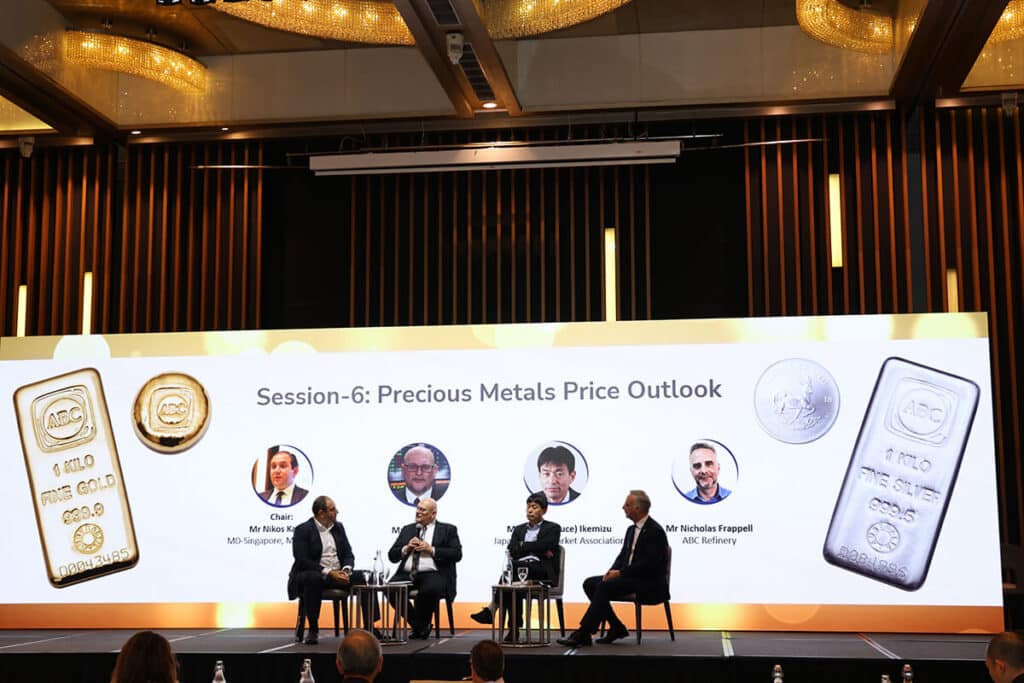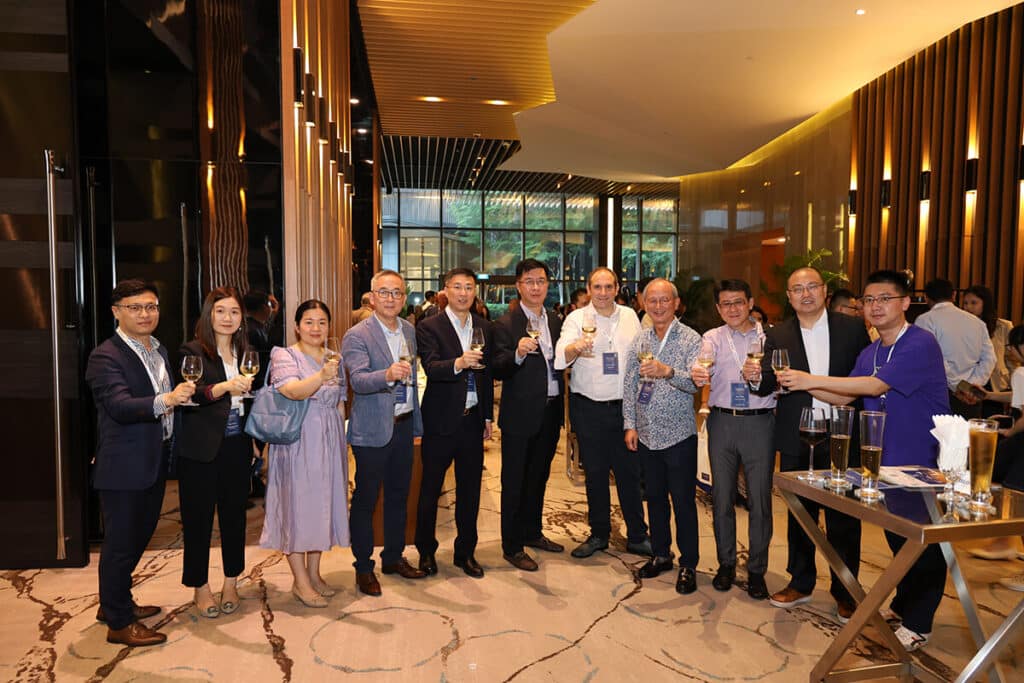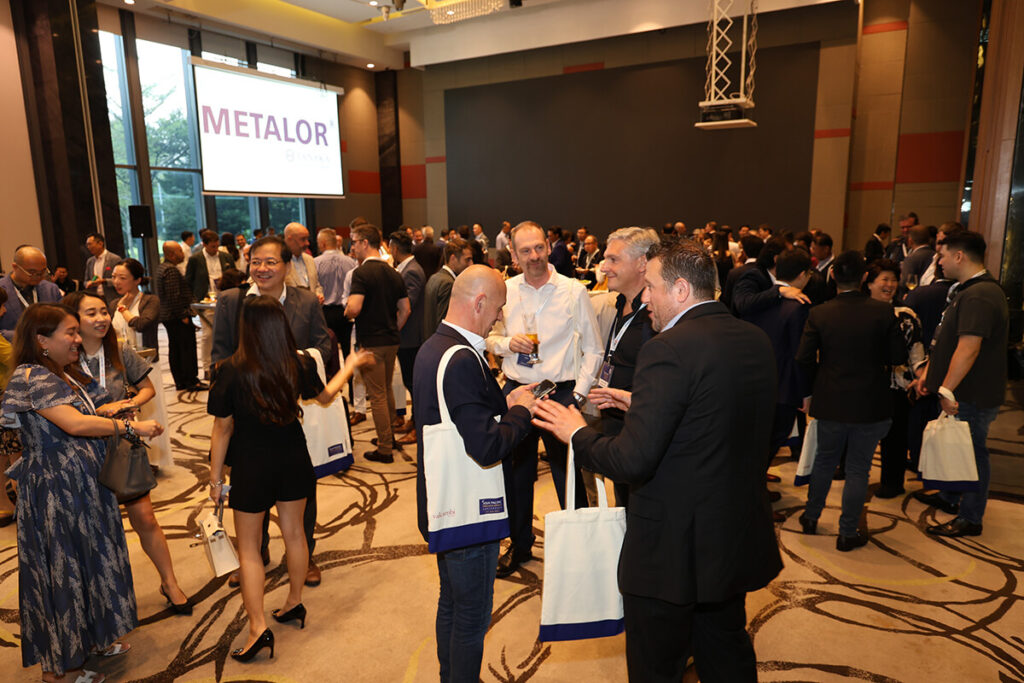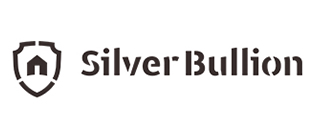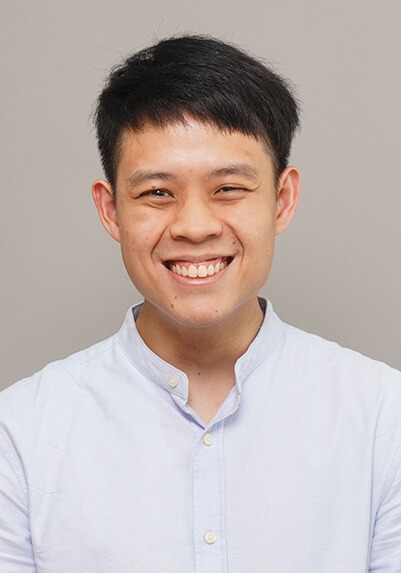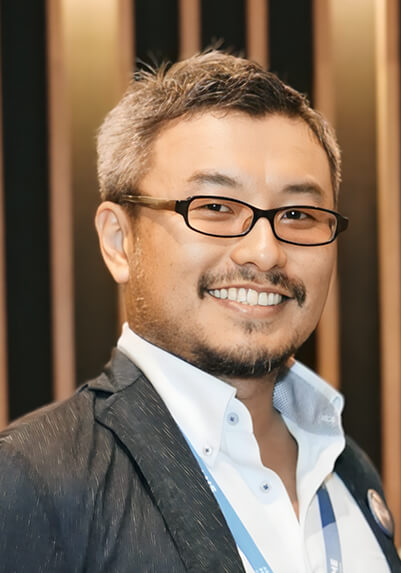Navigate
Article List
- What Next For Gold?
By Sachin Patel, Executive Director, Metal Products, CME Group
- SBMA News
By SBMA
- Nothing New under the Sun
By Joshua Rotbart, Managing Director, J. Rotbart & CO.
- What Happens When There is a Loss?
By Allan Finn, Director of Global Commodities, Malca-Amit
- Shanghai Platinum Week Shines Brightly
By Edward Sterck, Director of Research, WPIC
Article List
- What Next For Gold?
By Sachin Patel, Executive Director, Metal Products, CME Group
- SBMA News
By SBMA
- Nothing New under the Sun
By Joshua Rotbart, Managing Director, J. Rotbart & CO.
- What Happens When There is a Loss?
By Allan Finn, Director of Global Commodities, Malca-Amit
- Shanghai Platinum Week Shines Brightly
By Edward Sterck, Director of Research, WPIC
2023 Asia Pacific Precious Metals Conference Summary
By SBMA
The 2023 APPMC focused on ASEAN’s role in building an integrated precious metals market in the Asia Pacific region. Discussions covered market demands, Gold Bar Integrity, PGM, ESG initiatives, technological advancements, and price outlook.
Approximately 470 delegates from across the globe gathered to attend a series of insightful sessions featuring expert panellists and keynote speakers. The conference commenced with an opening speech by KL Yap, Chairman of SBMA, followed by four special addresses that set the stage for the discussions ahead.

Strategies And Initiatives For Singapore’s Precious Metals Hub
Ivan Tan, Director of Trade at Enterprise Singapore, took the floor to emphasize the significant role of the precious metals industry in enhancing the country’s trade. He outlined Enterprise Singapore’s strategy to establish Singapore as a prominent precious metals hub within the region, focusing on three key areas: improving infrastructure, expanding the participant network, and nurturing young talent.

LBMA’s Strategic Plan: Sustainability and Responsible Sourcing In Asia
Ruth Crowell, Chief Executive of LBMA, then enlightened the delegates on LBMA’s strategic plan concerning Asia, specifically addressing recycled gold, sustainability, and responsible sourcing. She mentioned LBMA’s collaboration with the ISO project to propose a globally recognised definition for recycled gold. Additionally, LBMA emphasised three other initiatives aimed at promoting sustainability and responsible sourcing: the Sustainability & Responsible Sourcing Strategy, Responsible Silver Guidance, and Artisanal Mining. Crowell encouraged participants to actively engage with LBMA, provide feedback on their strategies, and become more involved in their efforts.

World Gold Council’s Vision: Overcoming Trust Issues And Enhancing Market Integrity
David Tait, Global CEO of the World Gold Council, drew attention to the fact that trust issues, provenance concerns, barriers to market participation, capital costs, and settlement risks continue to deter institutional and retail investors from engaging with gold. Tait discussed various initiatives undertaken by the World Gold Council to address these challenges. These initiatives include launching responsible gold mining principles, implementing an international system of gold bar integrity in collaboration with LBMA, and developing principles for retail gold investment and responsible gold investor guidance in key markets, including Singapore. Tait urged the industry to collaborate in developing universally accepted solutions that uphold the highest levels of integrity.
TAIT URGED THE INDUSTRY TO COLLABORATE IN DEVELOPING UNIVERSALLY ACCEPTED SOLUTIONS THAT UPHOLD THE HIGHEST LEVELS OF INTEGRITY.
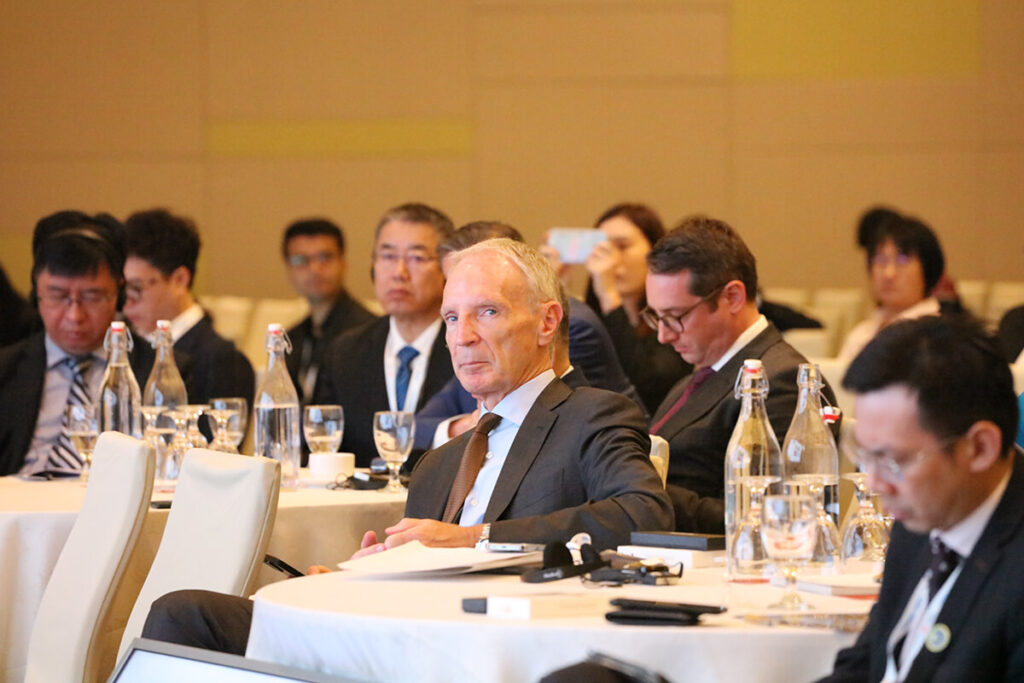
Shanghai Gold Exchange International: Advancing Integration In The Asia Pacific Gold Market
The final special address was delivered by Li Ming, Supervisor of Shanghai Gold Exchange International. Li shed light on SGE’s endeavours in advancing the integration of the Asia Pacific gold market. SGE established an ‘International Board’ in 2014, enabling direct participation of overseas investors in China’s market trading. Over time, the number of SGE international members has grown from 40 in 2014 to 100 as of May 2023. SGE has also been actively promoting the adoption of standardized market practices to foster integration within the region. Notably, this includes quoting Shanghai gold in RMB per gram, based on a 1 kg standard gold ingot with no lower than 999.9 fineness, and facilitating physical settlement within SGE. Moreover, SGE has facilitated the connection between domestic and international gold production capacities, with the aim of upgrading the regional industrial chain. Li firmly believes that the cooperation between the Chinese market and the Asia Pacific region holds tremendous potential for growth.
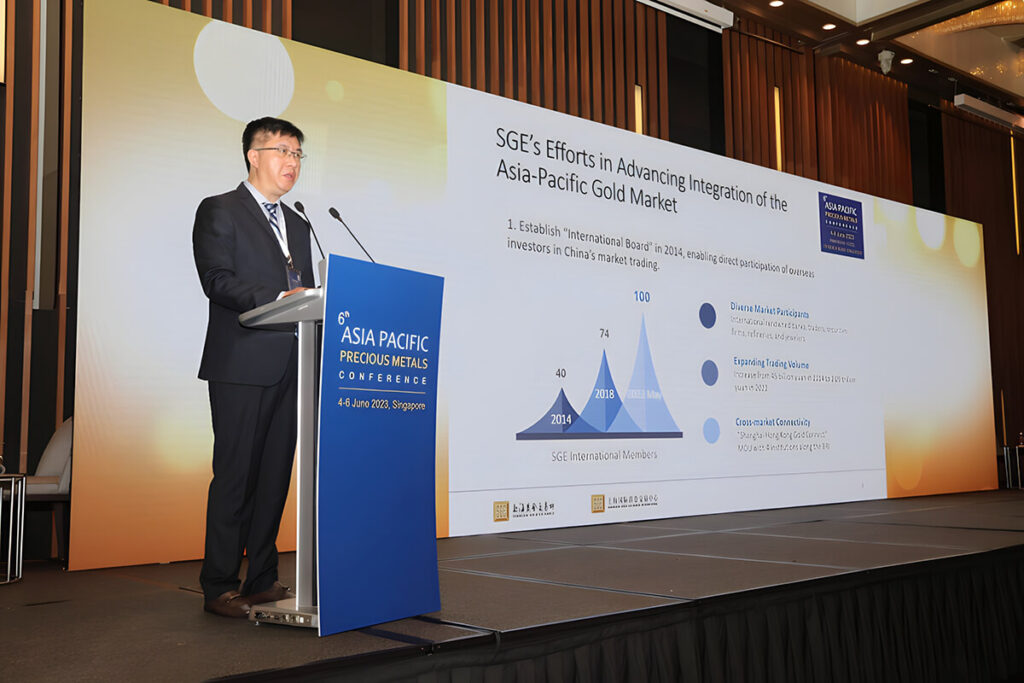
Keynote Speech: Macro Backdrop And The Role Of Precious Metals
Taimur Baig, MD and Chief Economist at DBS Bank, delivered a keynote speech on the macro backdrop, covering inflation, geopolitics, and the role of precious metals. Key takeaways: inflation is easing, but prices may need revaluation. Inflation peaked at 8%, with Core PCE data reaching 5.5% before trending downwards. Geopolitics could drive medium-term inflation, with factors like USD weaponisation and China’s strategies. Gold, despite expectations of a sell-off, remains valuable due to central bank purchases, indicating its future role in portfolios.
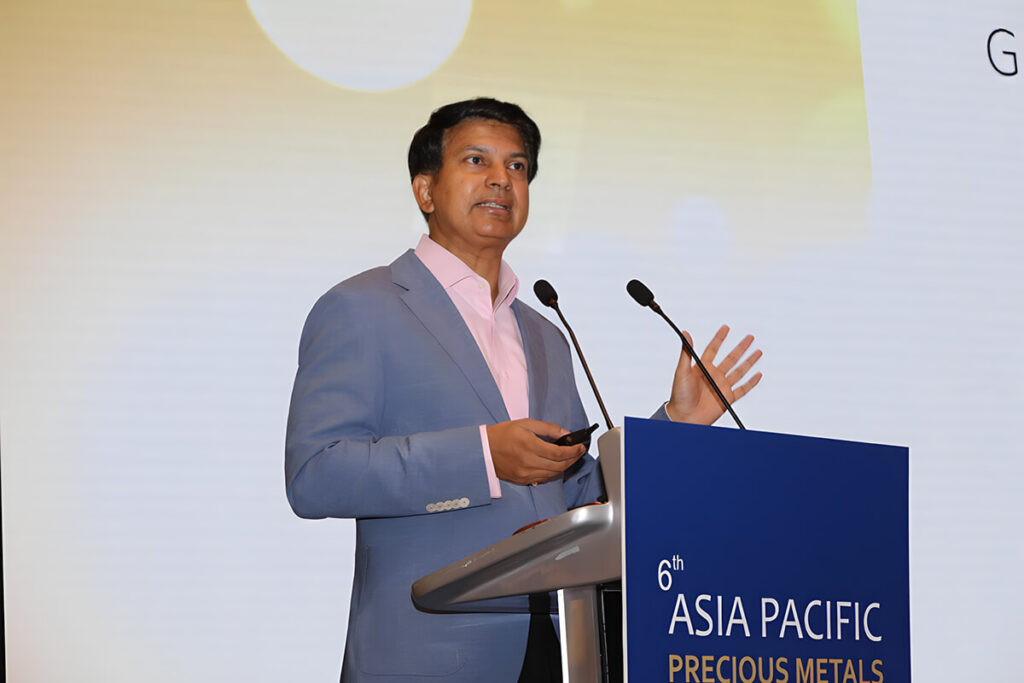
The first panel, moderated by Albert Cheng, CEO of SBMA, provided regional updates. Louis Ng, President of the Malaysia Gold Association, discussed the Malaysian gold market. Malaysia’s annual GDP growth rate during the pandemic was negative, but stability is expected at 4.5% in 2023. Gold jewelry exports matched pre-COVID levels at USD 1,341 million, but an upcoming luxury goods tax may impact demand.
Nuttapong Hirunyasiri, MD of MTS Gold Group, shared an overview of Thailand’s gold trade. Thai gold prices reached a record-breaking 32,965 baht in May 2023, while jewelry factories prioritize sustainability. Thai manufacturers are actively joining the Responsible Jewellery Council for responsible sourcing, and Thai companies are introducing digital platforms and gold wallets to promote local participation, he said.
HUYNH TRUNG KHANH, VICE CHAIRMAN OF THE VIETNAM GOLD TRADERS ASSOCIATION, ESTIMATED H1 2023 GOLD DEMAND AT 27 TONNES, WITH 8 TONNES FOR JEWELRY AND 19 TONNES FOR RETAIL INVESTMENT.
Huynh Trung Khanh, Vice Chairman of the Vietnam Gold Traders Association, estimated H1 2023 gold demand at 27 tonnes, with 8 tonnes for jewelry and 19 tonnes for retail investment. Decree 24 liberalised gold jewelry production and sales, simplifying requirements for gold tael bar production. However, it has allowed only foreign-invested enterprises to import gold raw materials for the purpose of manufacturing gold jewelry for export. Discussions with the central bank’s forex department aim to classify jewelry as regular commercial items and permit the sale of non-SJC gold tael bar brands.
Sahat Pangaribuan, Senior EVP of PT Pegadaian, discussed Indonesia’s gold ecosystem. Low domestic demand, despite being a global producer, led the government to prioritise development. Tax regulations will be reassessed, and gold exportation restricted. Promoting gold as an asset class requires strengthening the financial system and implementing appropriate measures, he noted.
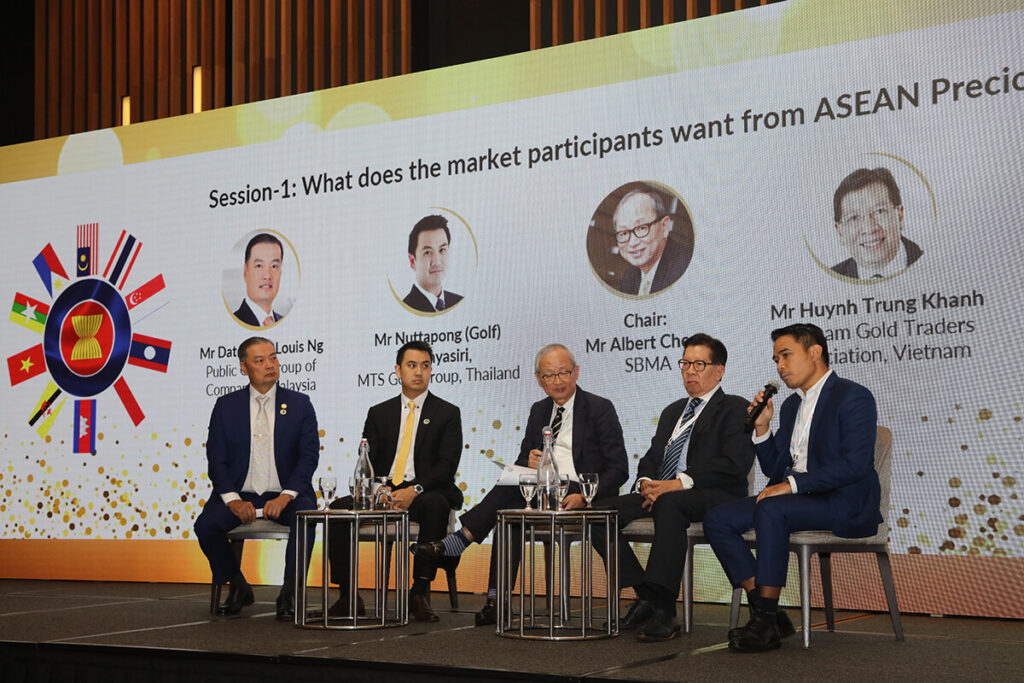
A special session on China, curated by the SGE, began with an address from Zhang Yongtao, VP & Secretary-General of the China Gold Association. Zhang highlighted China’s gold market, emphasizing its present state, opportunities, and challenges. He noted geopolitical tensions, a bleak global economic outlook, and rising global inflation as factors supporting gold’s significance as a safe haven and store of value. These factors are expected to drive China’s domestic gold market. However, tighter regulations in the private precious metals trading business have reduced gold trading volume, limiting market expansion. Zhang suggested standardising and internationalising the domestic market while improving physical gold repurchase channels.
Roland Wang, Regional CEO – China at the WGC, emphasized gold connectivity potential between China and ASEAN. China experienced a strong gold consumption recovery in 2023, with double-digit year-on-year demand growth predicted. ASEAN also maintained strong gold consumption. Wang highlighted the close trade partnership, China’s manufacturing prowess, and innovative gold products as a foundation for potential gold connectivity with ASEAN.
Li Ming provided further details on SGE’s international development initiatives, including the Shanghai Benchmark Price and the “Gold Road” Project. The project aims to streamline interactions between Chinese manufacturers and international enterprises using the SGE/SGEI platform. Li discussed four business models supporting the initiative. Lee Koon Wong, Head of Commodity Sales at ICBC Standard Bank Plc, provided insights into ICBC Standard Bank’s active participation in cross-border gold trading through the SGE Gold Road initiative.
Mary Lim, COO of SK Jewellery, expressed interest in collaborating with Chinese jewelry manufacturers to enhance production processes with advanced technologies and designs. This partnership benefits both Singapore and China, providing access to expertise and markets. Lim highlighted the trend of adults encouraging younger generations to invest in jewelry.
Wang Yuhan, Chairman of Dongwu Gold Group, reiterated collaboration potential between China and Southeast Asia’s bullion market. He emphasized China’s recognized bullion market, strong infrastructure, and jewelry manufacturing capabilities. Historical trade and cultural exchanges, Southeast Asia’s sizable gold market, and rapid growth support collaboration. Wang emphasised mutual benefits, such as new product development, regional financial stability, and increased cross-border trade.
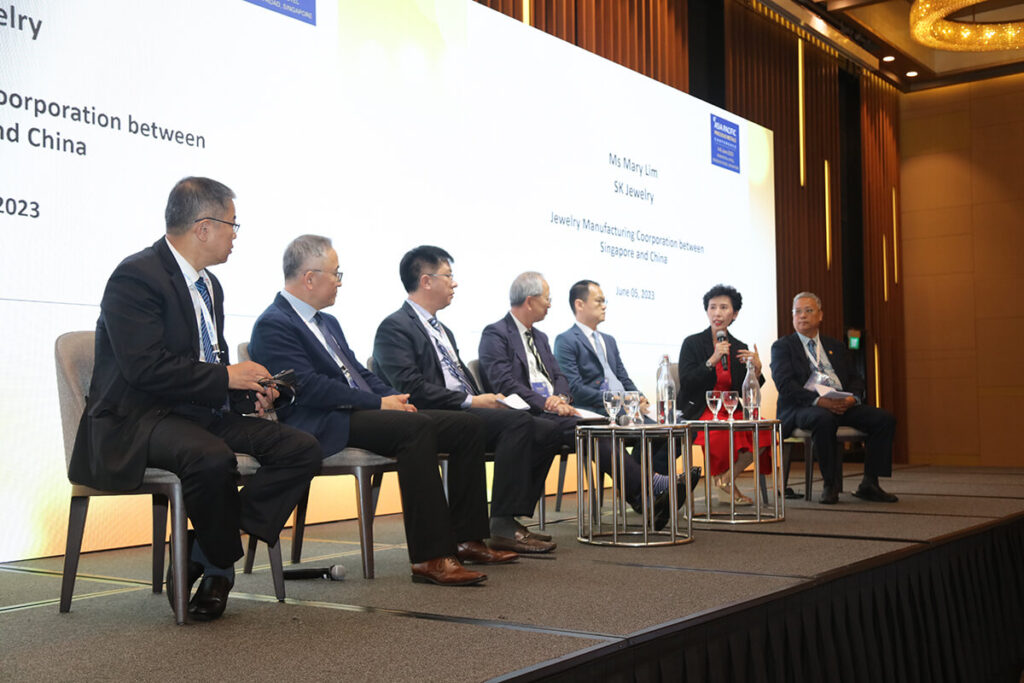
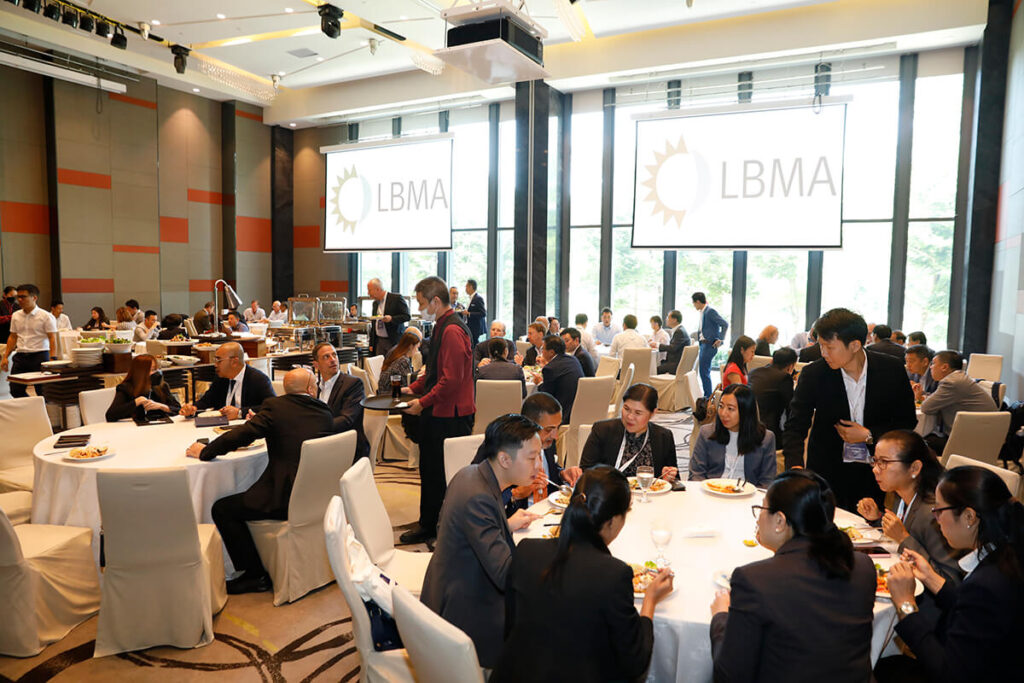
The second panel session, chaired by Sakhila Mirza (Executive Director, LBMA), focused on the Gold Bar Integrity (GBI) program. Mirza emphasized its objective to ensure genuine and responsibly sourced precious metals, free from fraud. Speakers elaborated on their contributions.
David Woodford (CFO, ABC Refinery) discussed the development of a security feature to identify counterfeit bars using QR codes, scanning, and coating/DNA markers. ABC Refinery also enabled authentication through a mobile app in collaboration with Provche.
Urs Röösli (CEO, aXedras Group AG) presented a blockchain-based bullion integrity ledger, facilitating data exchange among participants. It provides a digital twin for each bar, enhancing transparency and offering valuable information like custody and authentication. The decentralised aXedras ecosystem enables partners to exchange data through a single interface.
Gregor Gregersen (Founder, Silver Bullion) introduced GramChain, a real-time tracking system across Zurich, Dallas, and Singapore. It offers traceability, live broadcasts through RFID scanners, and integrates with Chainlink for reliable on-chain contract integration.
Sachin Patel (Executive Director, CME Group) shared LBMA and WGC’s findings on the GBI initiative. COMEX gold inventories and deposits at CME vaults increased due to geopolitical tensions. Patel highlighted milestones, including COMEX aligning with international standards for conflict-free gold, LBMA brands added for Gold and Silver Futures, and the requirement for responsible guidance compliance for silver, platinum, and palladium producers.
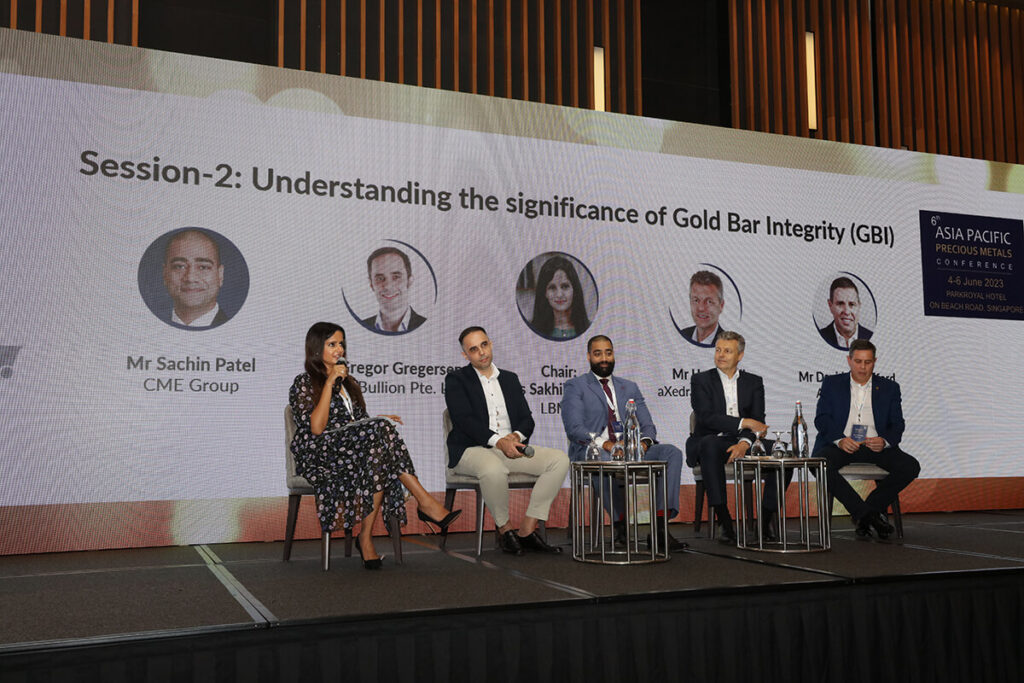
Ferry Irawan, Acting Deputy Minister for Macroeconomic and Finance Coordination at the Coordinating Ministry for Economic Affairs of the Republic of Indonesia, kicked off the second special session on Indonesia with a keynote address. He outlined the country’s economic growth targets, aiming for a 5.3% growth rate in 2023 and further increases in 2024. The government is committed to expediting structural reforms to enhance investment competitiveness and promote downstream activities in the natural resource sector. The development of the Indonesia Knowledge Network (IKN) will also be accelerated to boost the construction sector. Bullion services have made significant progress in Indonesia, with legal provisions in place for conducting such services within the country. Technical regulations (POJK) are being drafted to determine if financial service institutions can offer bullion services, and the government has reduced the tax on gold to expedite their implementation.
Agus Wibowo, Assistant Deputy for Financial Services and Information Industry at the Coordinating Ministry for Economic Affairs of the Republic of Indonesia, provided insights into the establishment of bullion services and their potential impact on the economy. The introduction of bullion services is projected to increase GDP by 0.15%, consumption by 0.28%, and investment by 0.32%. Optimizing the gold supply chain is expected to boost GDP by 1.3% and create approximately 800,000 new jobs. The implementation of bullion services could also increase the money supply by up to IDR 53 trillion, indicating substantial economic benefits.
OPTIMIZING THE GOLD SUPPLY CHAIN IS EXPECTED TO BOOST GDP BY 1.3% AND CREATE APPROXIMATELY 800,000 NEW JOBS.
To conclude the session, PT Pegadaian’s Sahat Pangaribuan gave a detailed overview of the company’s execution roadmap as the pilot for bullion banking. In Phase 1 (2022-2024), PT Pegadaian will introduce various products such as dore inancing, unallocated accounts for retail customers, and gold metal loans. Phase 2 (2025-2027) aims to offer a full suite of products including gold-backed financing, unallocated accounts, physical gold, and paper gold trading.
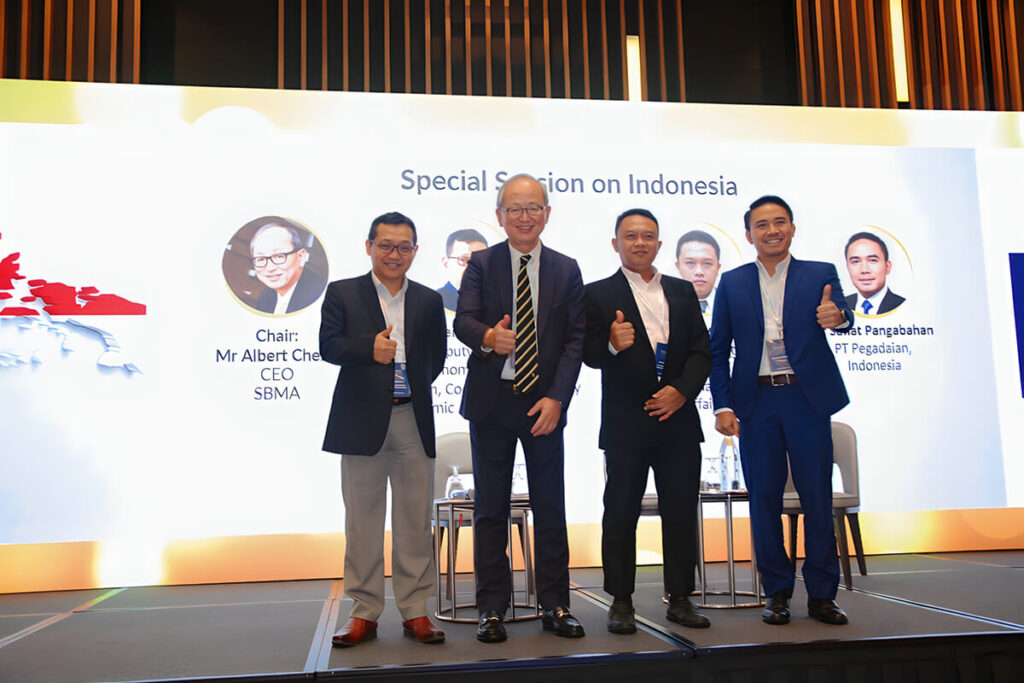
The conference then turned its focus to Platinum Group Metals (PGMs). Zhuoying Jing, Chairperson of the Asian WiPGM chapter – Women in PGMs, delivered a special address introducing WiPGM, an organisational network that promotes collaboration among women in the PGMs value chain. WiPGM provides a platform for learning, mentorship, and contributing to industry growth.
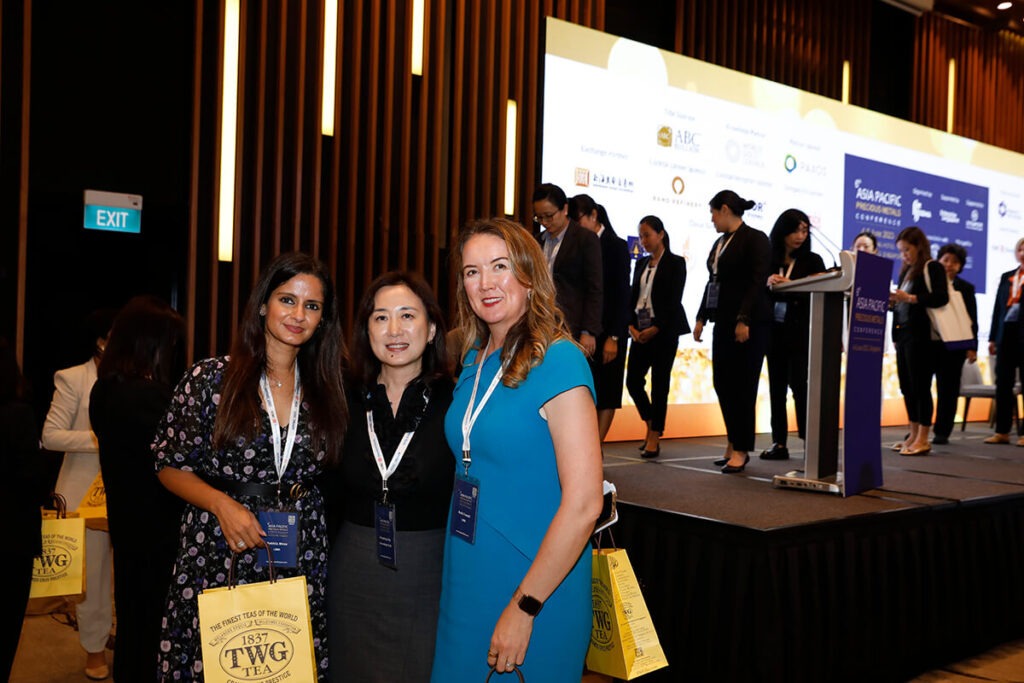
The third panel session, led by Martin Huxley, Honorary Advisor of SBMA, centred on the rise of PGMs in ASEAN. Frank Chen, Founder of BR Metals, introduced the company specialising in collecting, sampling, and recycling scrap materials containing platinum, palladium, and rhodium.
Deng Weibin, Regional Head – Asia Pacific of the World Platinum Investment Council (WPIC), provided insights into the formation of WPIC and its response to increasing investor demand for platinum. Global platinum demand grew by 28% YoY in 2023, with South Africa and Russia as major suppliers. Deng highlighted platinum’s primary use in automobiles and its emerging demand from green hydrogen fuel for electric vehicles.
Gregory Frith, Director of Precious Metals Sales & Trading at StoneX, highlighted the company’s leading position as an OTC physical and hedging counterparty for various precious metals.
Frith proposed establishing an Asian Catalyst Recycling Hub in Singapore to centralise spent catalyst recycling from major markets, aligning with the shift toward environmentally friendly vehicles. He expressed optimism about increased PGM trading with Japan, given its advanced manufacturing capabilities and appeal for foreign investment.
Simon Huang, Managing Director of Sino-Platinum Metals, concluded the panel session by showcasing the company’s extensive ASEAN operations since 1938. Sino-Platinum Metals specialises in automotive catalysts, precious metal alloy materials, and pastes for electronic components. They offer a wide range of platinum-based solutions for catalysts, alloys, and electronic applications.
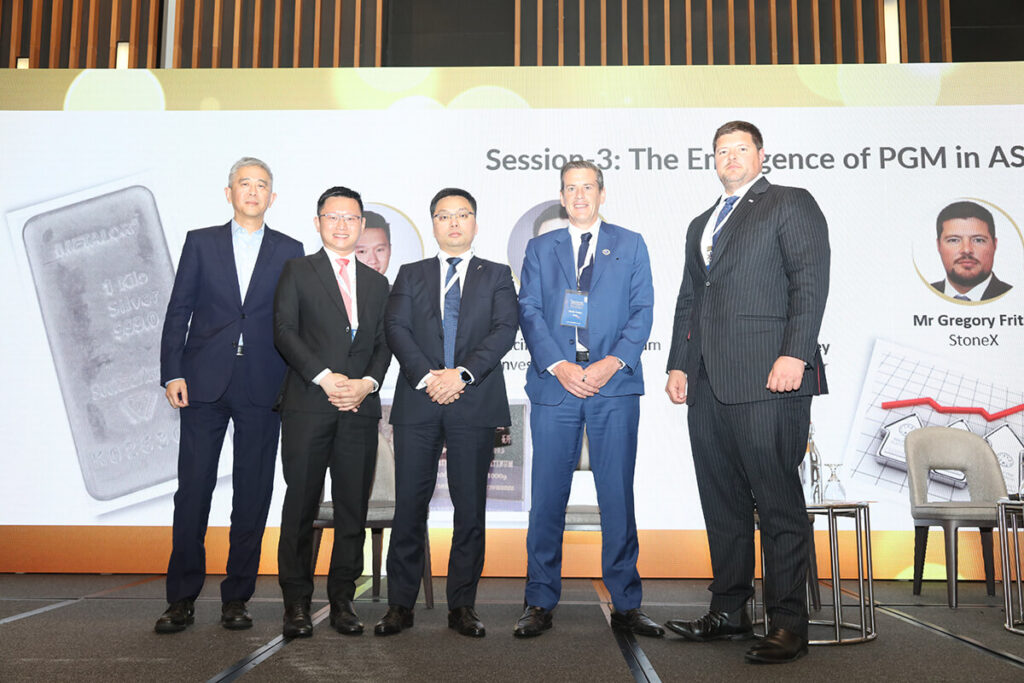


On the final day, Kamlesh Sharma, GM & Head of Precious Metals at IFSCA, initiated the session on India’s gold market. With India being the second-largest gold importer globally, IFSCA aims to establish the India International Bullion Exchange (IIBX) in collaboration with five market intermediary institutions. It plans to enable foreign banks for trading and custody of bullion, expand vaulting facilities, and introduce derivative products via IIBX.
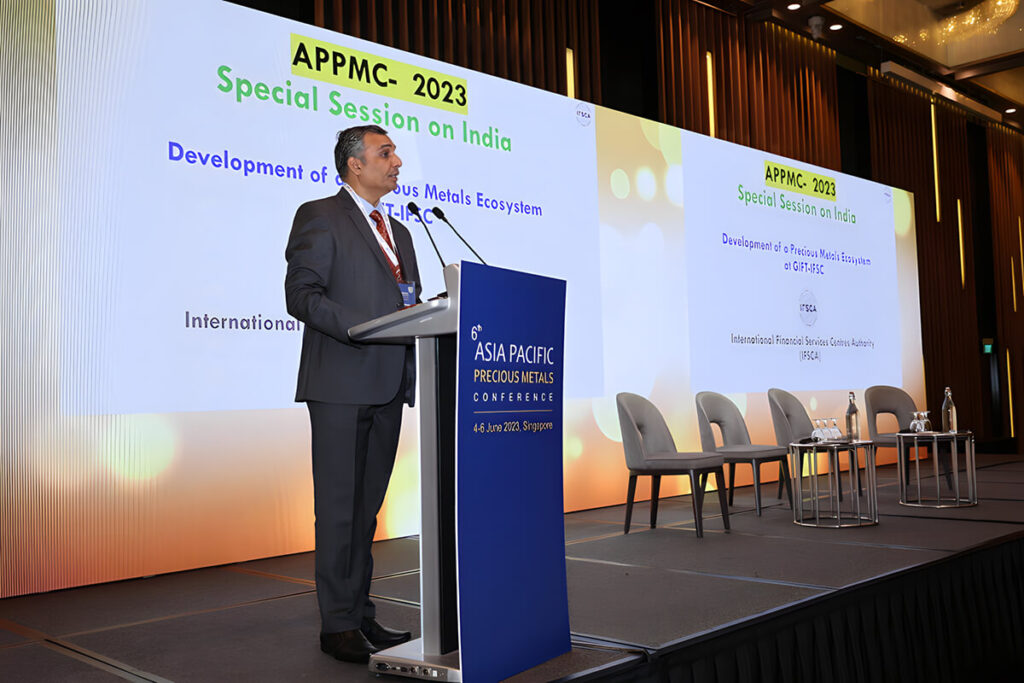
The fourth panel session, led by Hannah Brandstaetter, ESG Programme Director at WGC, focused on ESG initiatives in the gold industry. Brandstaetter highlighted the Gold Industry Declaration of Responsibility and Sustainability Principles, emphasising responsible sourcing, sustainable development, human rights, and diversity. Wayne Gordon, MD of UBS AG, mentioned UBS’s commitment to environmental and societal issues. Jonathan Jodry, BD Director at Metalor Technologies, discussed their ESG initiatives, including strict gold sourcing regulations and compliance with the Responsible Jewellery Council’s standards. Robin Wang, Executive Chairman of Zijin (Singapore) International Mining, shared Zijin Mining’s goal to become a green and efficient company. They aim to reduce their carbon footprint, employ local residents, and restore vegetation.

The fifth panel session, chaired by Andrew Naylor, examined technology and innovation in the precious metals industry. Anoushka Rayner, Head of Growth – Commodities at Paxos, discussed how blockchain technology can improve market infrastructure. Paxos offers regulated custodian, infrastructure, and token services, including PaxG, a regulated gold token backed by LBMA-accredited physical gold. Tokenising gold enhances transparency and expands investment opportunities, she highlighted.
PAXOS OFFERS REGULATED CUSTODIAN, INFRASTRUCTURE, AND TOKEN SERVICES, INCLUDING PAXG, A REGULATED GOLD TOKEN BACKED BY LBMA-ACCREDITED PHYSICAL GOLD.
Steven Randall, Director at Kallanish Index Services (KIS), introduced their gold reference price offerings in Asia to enhance pricing transparency. KIS delivers precise daily reference prices for kilobar spot premiums in Singapore, Hong Kong, and Bangkok, providing flexibility in data selection, comparison, and export.
Peng Jingkai, Senior VP at HydraX, presented the platform’s regulatory-compliant financial infrastructure solutions. HydraX enables traditional finance companies to transition to Web 3.0 through token management, exchange services, self-custody solutions, and digital asset custody. Features include Smart Order Routing, Real-time Positions Management, and Liquidity Management.
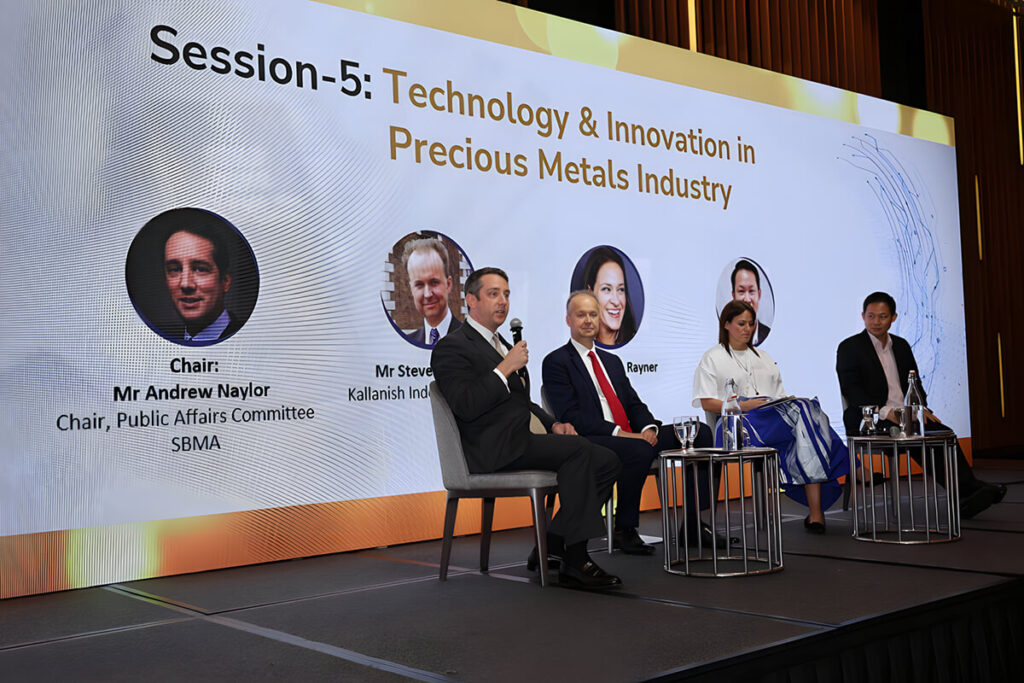
The sixth and final panel was packed with information and kicked off with the launch of the 2023 Gold Focus by Nikos Kavalis (Managing Director, Metals Focus Singapore). He was later joined by Bruce Ikemizu (Executive Director, JBMA), Nicholas Frappell (Global Head Institutional Markets, ABC Refinery) and Bart Melek (Managing Director and Global Head of Commodity Strategy, TD Securities) as panellists to discuss gold’s price outlook.
The panellists shared a consistent bullish outlook for gold in the long term. Melek anticipated a potential pivot by the Fed towards accommodative policy rates, leading to a decrease in real interest rates and supporting gold prices.
TD Securities set a target of US$2,100 for the end of the year. Ikemizu expressed optimism due to geopolitical factors, de-dollarisation, and increasing US public debt, favouring gold over the US dollar. Frappell concurred with Ikemizu’s long-term analysis but noted a possible short-term dip to around US$1,800 due to reduced liquidity after the debt ceiling agreement.
